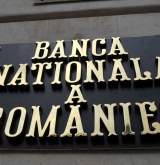Confidence in the Romanian banks was shattered by the demise of Lehman Brothers
In the local banking system, credit institutions are yet too small compared to United States’, and their luck was that the National Bank of Romania has restricted access to the toxic asset territory, which was considered to be the “playground” of the foreign bankers.
However, Romanians’ confidence in banks has faded after the world’s banking giants, Lehman Brothers, Fannie Mae and Freddie Mac went bankrupt.
As a result, consumers started to take out their money from their savings accounts in Romanian credit institutions.
Taken by surprise, and lacking the required liquidity, banks shifted focus to the central bank’ lending facility as a source for cash flow. In October 2008, NBR lent a record 49 billion lei (13.3 billion euros at a median exchange rate of 3.6827lei/euro) to banks.
Furthermore, as the world’s banking system became capital constrained, the parent banks reduced their funding to their Romanian subsidiaries or raised costs. Banks started to encourage saving among consumers by lifting interests rates at over 15% for deposits in local currency and at 7% for deposits in euro.
Loan against ID or toxic assets
Companies in Romania saw their sales weakening slowly but surely, as banks started to tighten lending conditions and profit outlook got dire. And when revenues fall drastically, cost-cutting measures are required. As local companies’ cash eaters were the payrolls, they started to lay off staff, cut perks or reduce pay packages.
With lower incomes, Romanian borrowers were beginning to face hardships in paying their monthly rates, especially those who took imprudent loans.
The head of Credit Bureau, Serban Epure said in March 2009, that the majority of bad debtors had a relatively low debt for an unsecured consumer loan. The institution said that since the beginning of 2009, lending pace scaled back while delinquency rate went up.
Since the crisis erupted in Romania – September 2008 – by end-July this year, delinquencies rose to 5.9 billion lei, up 175% from 2.15 billion lei. Economists say the increase in delinquencies has further to go.
Word of the day: restructuring
The biggest cost-containment programs were run by Bancpost, and ING Bank Romania, both institutions encouraging employees to take voluntary unpaid furloughs.
Banca Comerciala Romana and BRD Groupe Societe Generale, Romania’s largest banks by assets have trimmed workforce by nearly 1,000. Raiffeisen Bank announced a similar measure for 2009.
This year, employees of Credit Europe Bank have called for the support of Trade Unions Federation for Insurance and Banks (FSAB), after the bank had announced a restructuring process, in which it forced the employees to sign their resignation in order to avoid additional spending on severances.
BCR has restructured around 2,500 loans of persons who missed their monthly payments, 70% of which being represented by mortgage delinquencies. Banca Transilvania has launched a recession-proof platform which includes a loan restructuring option for small and medium-sized companies designed to help distressed companies amid a global economic turmoil.
OTP Bank Romania has adopted a more drastic measure: it restructured over 2,000 loans year to date, and started the foreclosure proceedings against borrowers who failed making their payments even two months after being restructured.




























































![HR [PLAY] Tech Workout - 11...](https://www.wall-street.ro/image_thumbs/thumbs/973/x973fe0a3888d417feff63de42e814180-260x260-00-65.jpg,qv=1714005833.pagespeed.ic.8JsqLrmwPf.jpg)










